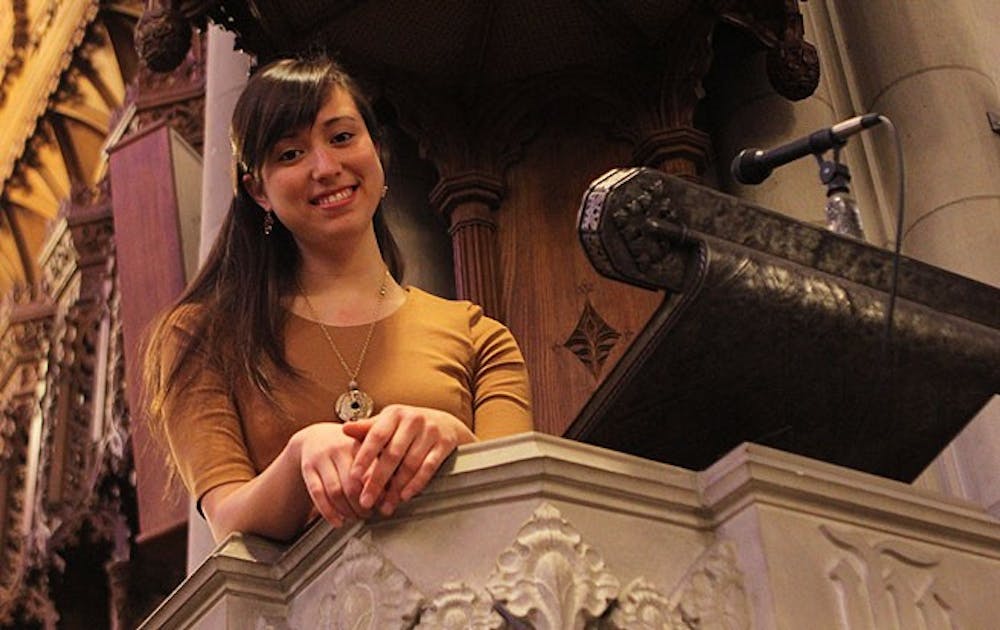When writing the student sermon that she delivered to the Duke Chapel this weekend, senior Jocelyn Streid found inspiration among her fellow Cameron Crazies at 4 a.m.
On Sunday morning, Streid took to the pulpit in place of Dean Luke Powery to give the student sermon. An English major and pre-medical student from St. Louis, Streid preached to a full Chapel about health care, death and liturgy. Her sermon focused on the intersection between theology and medicine, and in particular, the human obsession with prolonging life.
“Conceptually I’m really interested in the intersection between the theology narrative and medicine,” she said. “I’m really fascinated by palliative care and the end of life, helping people work through those decisions.”
An annual event, the student sermon is chosen from submissions. The Chapel usually receives four to 10 student sermon submissions a year, and a panel of four chapel representatives choose the strongest piece, said director of worship Meghan Feldmeyer, a member of the committee.
“This year they were all really lovely, and it makes me sad to turn the others down,” Feldmeyer said.
Streid said she had dreamed about giving the sermon since she was a freshman.
“It’s been a special pulpit for me since so much wisdom has come from there, so the thought that I’m going to be up there is very strange and really thrilling and really humbling,” Streid said on the Saturday before she gave the sermon.
Like any self-respecting Blue Devil, Streid wrote her sermon while black tenting in Krzyzewskiville for the Duke men’s basketball game against the University of North Carolina at Chapel Hill. In a theological turn, she and her friends named their tent ‘The Tent Kommandments.’
“Commandments spelled with a ‘K,’” she said.
Streid noted that she was worried about the quality of her speech because she wrote the sermon outside very early in the morning.
“It said what I wanted to say, but I had kind of written it in KVille at four o’clock in the morning, so I wasn’t sure what the quality was like at all,” she said. “It was really early in the morning, and everyone in my tent was asleep. I was in the cold and I was all bundled up. My laptop was plugged in the external outlet outside Wilson [Recreation Center], so it was kind of strange.”
Despite her fears about the sermon’s quality, attendees said Streid’s speech was very moving.
“She was willing to discuss the end of life frankly and compassionately,” Rodney Wynkoop, director of chapel music and professor of the practice of music, said.
For her sermon, Streid chose to speak about death and the limitations of modern medicine. She spoke about the human obsession with death and prolonging life through the aggressive use of medicine, relating it to a passage from scripture—Luke 13:31-35.
“Death is scary, watching the death of our loved ones scarier,” she said during the sermon.
She said the death rate, however, has been always been 100 percent, and it is a fate everyone will eventually have to face. She ended her sermon by speaking about the eventuality of death in the context of the Jesus and describing death as an Exodus.
“She left us thinking with the last line,” senior Joan Nambuba said.
Elaine Sembers from Pennsylvania was visiting her sister in North Carolina when she stopped to attend service at the Chapel. Tearing up, she said that Stried’s sermon had special meaning for her because she had just recently lost her parents.
“It was a beautiful sermon and enlightening, and it gives me more faith to get though the next… whatever,” Sembers said. “It’s difficult but her words were very inspiring and very helpful.“
Christy Lohr Sapp, associate dean for religious life, said that she knew that several members of the congregation were dealing with terminal illness in their families and that people from the Medical Center also attended the service. Lohr Sapp said she hoped these attendees gained hope and comfort from Stried’s service.
Before going to medical school, Streid will take two years off to work in public health.
“I just want to spend several years in service, exploring health care in a way I wouldn’t be able to while wearing the doctor’s hat,” she said.
Get The Chronicle straight to your inbox
Signup for our weekly newsletter. Cancel at any time.

